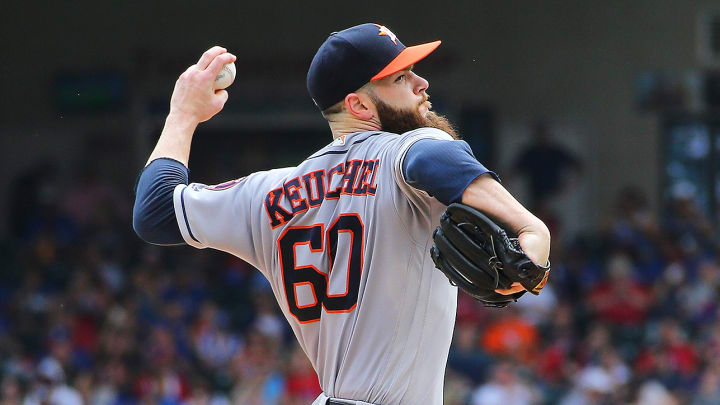2. Houston Astros (72–45, plus-154, LT: 2)

Dallas Keuchel calmed things down a little on Sunday, tossing 6 ⅔ innings of one-run ball to beat the Rangers. That was a welcome sight. Keuchel had just been just strafed for eight runs and 10 hits by the lowly White Sox in his previous outing, raising concerns about a pitcher who’s otherwise been excellent this season, but also missed nearly two months with a neck injury in June and July.
Still, the Astros are hardly out of the woods when it comes to their starting pitching. Their No. 2 starter Lance McCullers Jr. was nearly unhittable in his first 14 starts of the season ... before allowing 25 runs in his next 24 innings of work. He hit the DL at the end of July with a back injury, and is coming along slowly in his rehab, having not yet started pitching again off a mound. And none of that addresses the issue of workload, with McCullers having never thrown more than 158 innings in any season of pro ball.
Even if Keuchel’s back to his old ace self ... and even if McCullers does make it back healthy fairly soon ... and even if Charlie Morton continues to pitch fairly well as a mid-rotation option ... and even if Brad Peacock maintains a high strikeout rate ... why would the Astros stand pat with what they have? This is an offense that’s not only been the most productive in the majors this year—it’s been better than any other team’s offense, on a park- and league-adjusted basis, in the past 100 years.
The Royals of 2014 and 2015 showed that teams can win big without having deep and wildly talented starting rotations. But they also were probably an anomaly. Justin Verlander’s sitting out there for the taking. The Astros have 17 days to work out mutually beneficial terms with the Tigers. They have 17 days to make the very obvious, and very correct move for a team with legitimate World Series aspirations.
